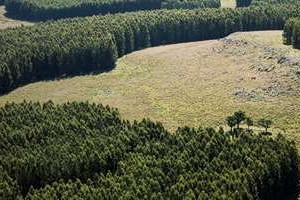 Why are Uruguay and pulp a perfect fit for the planet?
Why are Uruguay and pulp a perfect fit for the planet?
In the coming decades, the global population is expected to increase by two billion people. How do we meet their needs, sustainably?.The United Nations expects the world’s population to reach 9.7 billion by the year 2050 – an increase of two billion people, in just three decades. The majority of population growth centers on Africa and Asia, where rapidly developing economies are lifting millions of people out of poverty, giving rise to a new global middle class.
By all estimates, many of these two billion people should lead longer, happier and wealthier lives than their parents. However, that increase in wellbeing comes with an asterisk.
For decades, we in industrialized nations have built our welfare on waning resources. Fossil fuels, pumped out of the earth’s crust, have been harnessed to produce exuberant material wealth – all the while draining our resources and polluting our atmosphere. The question is, can our planet, already stretched to its limits, accommodate the needs of two billion more? How do we ensure that developing nations, too, can partake in the wellbeing we have taken for granted?
At UPM Pulp, we believe the answer is in fibres – renewable, recyclable and sustainable wood fibres.
This is the background against which we are building the world’s biggest pulp production line in Paso de los Toros, Uruguay. The new pulp mill will increase our yearly output by nearly 60% and more than double our production of eucalyptus pulp. This significant step change allows us to grow with our customers in Asia and in Europe, providing fibres for tissue papers, hygiene products and packaging materials – to meet the needs of a growing global middle class, sustainably. Unhindered by the pandemic, the project proceeds on schedule, and we expect production to start by the end of 2022.
With a massive leap in production volume come questions of environmental and social sustainability. How do we ensure the renewability of wood material? What are we doing to combat deforestation and biodiversity loss? What does the project mean for local communities?
In Uruguay, plantation forestry breathes new life into local ecosystems and economies. The wood used in both our Uruguayan mills – in Fray Bentos and soon also in Paso de los Toros – comes from sustainably managed local eucalyptus plantations planted on former cattle grazing land. The plantations form a considerable carbon sink, increase absorption in the soil, reduce erosion and improve the soil’s capacity to hold nutrients. Combined with the mill investment, they provide a significant boost to the local economy: as job opportunities for workers, as rent payments to cattle farmers, as tax revenue for the state and as investments in infrastructure throughout the country. For thirty years, our success in Uruguay has leaned on the success of local communities. With the Paso de los Toros investment, our commitment to Uruguay, to its people and its ecosystems, takes the next step.
The more we replace fossil-based materials with renewable wood fibres, the better our chance of meeting the needs of a growing global population without overburdening our planet. If done right, this transformation can marry business interests with climate goals – to align economic wellbeing with global efforts on sustainability. The world needs more fibres, and soon, we are ready to deliver.
Tomas Wiklund
Senior Vice President, Pulp Sales
